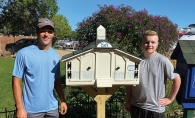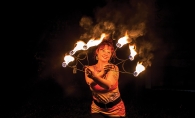Twenty-five years is an impressive length of time to do anything—let alone your dream job. That’s why we’re tipping our hats to Minnetonka’s Julie Sjordal, who’s celebrating 25 years of service, including four years as executive director, at St. David’s Center, a nonprofit organization that helps children in early childhood and families in need.
Sjordal, who grew up in Minnetonka, can’t remember a time when St. David’s Center wasn’t part of her life. “It feels like it’s full of fate and beauty as I look back at my own journey,” she says. “My baby sister [Angie], who is now in her mid-40s, was born in 1968 with Down syndrome. She was born at a time when there were not resources [for kids with special needs] in the community, and my parents were advised to institutionalize her.” Sjordal’s parents decided immediately to care for Angie, their sixth child, at home—and heard about St. David’s Center. The center, which began in the 1960s as a church-run preschool, was becoming known for its work with children with disabilities. “St. David’s Center became for my parents and family what it’s been for so many families: a lifeline in a time of grief and worry about what the future held,” Sjordal remembers, adding that her mom also taught at the school at one time.
Angie started school at St. David’s Center as a 3-year-old, and the center has been part of her life ever since, says Sjordal. “I remember coming to St. David’s with my mom and Angie, and I volunteered there as a young person. Then I decided to go into teaching.” After graduating with a degree in elementary and special education, Sjordal heard that St. David’s Center was starting a home-visiting program, and she applied for a job.
“I fell in love with the organization,” she says. “I had my own caseload and I helped grow the home visiting program.” Over the next several years, Sjordal would expand her leadership role, eventually overseeing many programs and growing St. David’s Life Phase services, which offer help to people with special needs as they enter adulthood and face new challenges and opportunities. Explains Sjordal, “There are many people with disabilities, even if they have some early intervention, whose special needs will be with them for a lifetime and who will need support.”
Things have certainly come full circle for Sjordal, as she helps other families the way St. David’s Center once helped hers. Vicki Degner’s son Ryan, now 27, started receiving autism services at the center when he was 3. “The care we got from St. David’s really kept our family together, as well as provided some early intervention for Ryan,” says Degner, who also worked at the center for several years as a case manager. She has nothing but praise for Sjordal. “Julie has this beautiful ability to engage people. She’s so filled with enthusiasm, and such kindness, and an incredible listening capability. People want to join her, and they also feel very safe in her presence.”
That special touch has helped Sjordal lead St. David’s Center to growing success. In 2009, the center’s executive director exited, and the board asked Sjordal—who was by then the center’s managing director—to step in as interim executive director. They soon asked her to accept the full-time role. “It’s been a great opportunity,” she says gratefully. “When I stepped in, I could see the opportunity we’d have to grow our reach into the community.” Under Sjordal’s direction, the center has made a point to work in close partnerships with other social services organizations and nonprofits. “And I have a great team,” she adds with a smile, “awesome staff out there doing good work.”
Like most nonprofits, St. David’s Center faces an ongoing funding challenge, but Sjordal says that a strong business plan helps keep things grounded: “To be a great organization with a great mission, you have to have a good business model.” In December, thanks to Sjordal and her team’s hard work, St. David’s Center received the largest grant in its 53-year history to help fund a major expansion and improvements to its aging facilities: $2.25 million from the Peter J. King Family Foundation. Ultimately, says Sjordal, the mission never changes: “It’s a way of being with families. This organization has grown and blossomed and responded to community need over the last 53 years.”









